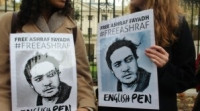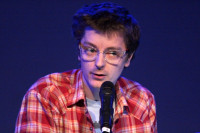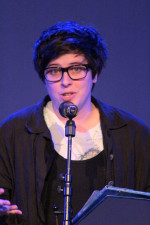'Privileged' poets engage with writers at risk at English PEN festival

The idea was: pair 30 poets with 30 writers at risk from regimes around the world, and commission new work from each of the free writers to draw attention to the plight of those that are not free, or under threat. The poets stood up at the English PEN modern literature festival at Rich Mix in east London on Saturday to deliver their responses, in an event created and curated by the poet SJ Fowler.
Award-winning poet Andrew McMillan, pictured, was paired with a jailed poet with one of the highest profiles at the moment: Ashraf Fayadh, a Palestinian accused of renouncing Islam, whose death sentence imposed by a Saudi court was replaced with an eight-year prison term and 800 lashes after a worldwide outcry.


One of the most moving moments during the afternoon sessions came with the screening by poet Lucy Harvest Clarke of a YouTube video showing Chinese poet, artist and human rights defender Liu Xia being visited in 2012 by supporters while under house arrest. During tearful scenes she whispers repeatedly in the ear of one of the activists. She has been under illegal house arrest since 2010, when her husband, the writer and activist Dr Liu Xiaobo, was awarded the Nobel peace prize, according to Amnesty International.

You can find the names of all the festival performers and the writers they were paired with here. Many of the predominantly young poets I hadn’t heard before, and it was good to see them all standing up there, producing work that in more than one case they said had been difficult to write.
With some readings, there was a lack of introductory context about the writer at risk, and it might also have helped to have a picture and name of each one in turn up on the screen. But English PEN’s first festival of modern literature, with free entry, was nevertheless a bold, educational and imaginative initiative to engage our privileged artistic community with the much riskier world beyond. I do hope that it will be repeated.
Greg Freeman





steve pottinger
Thu 7th Apr 2016 17:30
Well done, PEN. A simple idea, but – as so many of the poets discovered – also one which challenges us and takes us out of our comfort zone. And keeps vulnerable writers in the public eye.